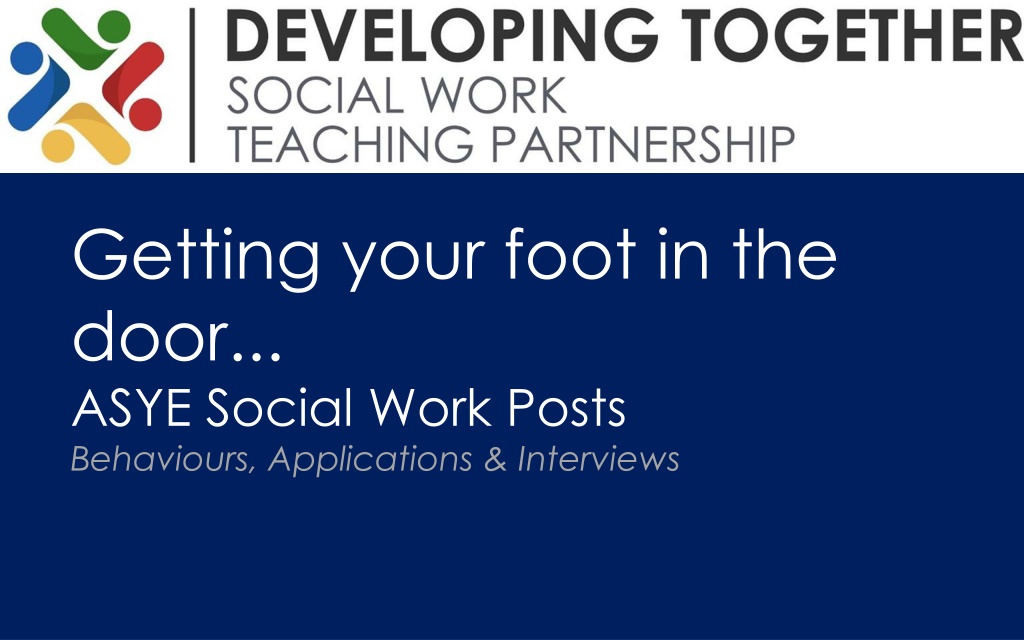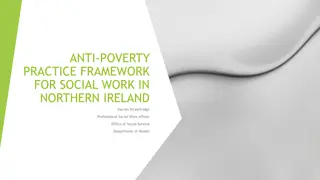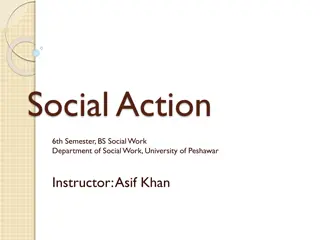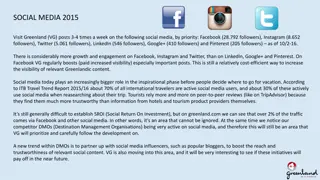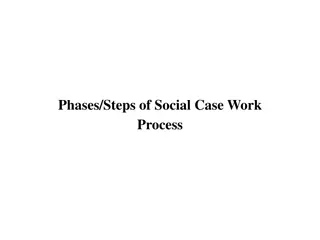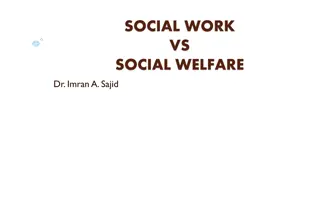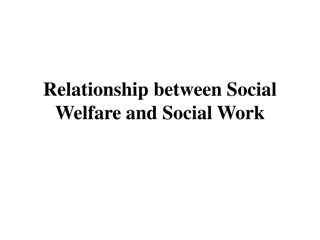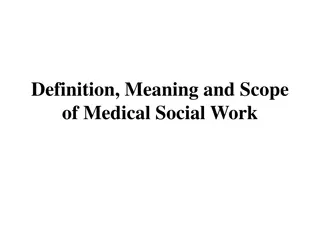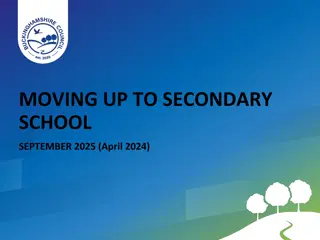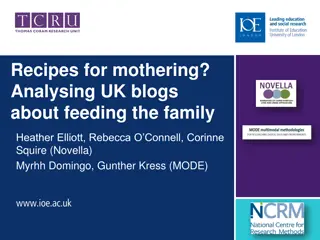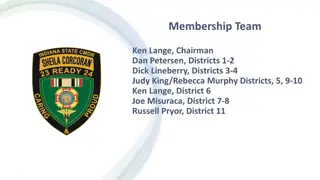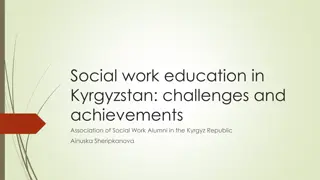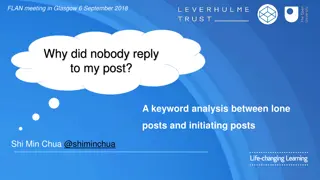Tips for Applying to ASYE Social Work Posts
Providing insight on key behaviors, application strategies, and interview preparations for ASYE social work roles. Learn about demonstrating essential behaviors and skills, crafting impactful personal statements, and maximizing your application's potential. Gain valuable advice to enhance your chances of securing your first social work post during challenging times.
Download Presentation

Please find below an Image/Link to download the presentation.
The content on the website is provided AS IS for your information and personal use only. It may not be sold, licensed, or shared on other websites without obtaining consent from the author. Download presentation by click this link. If you encounter any issues during the download, it is possible that the publisher has removed the file from their server.
E N D
Presentation Transcript
Getting your foot in the door... ASYE Social Work Posts Behaviours, Applications & Interviews
A message from the Teaching Partnership Disappointingly, due to the current Covid-19 coronavirus emergency, the face to face employment skills sessions due to be delivered by local employers on 23rd and 27th March had to be cancelled. The agency leads were really looking forward to meeting you and helping you prepare for your NQSW applications and want to wish you every success in securing your first social work post. We have adapted some of the material that was due to be presented so that you can still access lots of the information and we ve also added extra details to bridge the gap between learning online vs face-to-face. Please be sure to read the speaker notes underneath the slides as well as the slides themselves! We ve added more example interview questions, additional hints and tips, and provided links to useful resources, including links to each of our partner agencies NQSW role profiles, which should always be your starting point! We hope this is useful for those applying for their first social work post, and welcome any feedback you might have (admin@developingtogetherswtp.org.uk) so that we can incorporate this into subsequent employment skills packs / workshops. Wishing you all the best during this challenging period, Libbi Aldred - Project Lead for the Teaching Partnership
Introduction What we do: We read and shortlist job applications for ASYE We chair ASYE interviews We provide feedback to candidates on their interviews What do you want to get out of this session?
Behaviour & Skills What should you be able to demonstrate? Behaviours Curiosity Respect Humility Passion Simplicity Working Together Skills Direct work Assessment Analysis Planning Intervention Reflection
Applications/Personal Statements Your first (& potentially last) opportunity for a good impression Interview No Thank You
Applications & Personal Statements Don t Copy & Paste Use the Job Specification as a structure It is all about your relevant experience Two sides of A4 max! Confidentiality Where are: our (the local authorities) and your values? Children/Adult Social Care/Third Sector experience is all transferable Check your spelling, formatting, & font style Your Practice Educator should be your first reference
Preparing an Application/Personal Statement Think about a child, adult or family that you have worked with whilst on placement, and consider for 5 minutes Why were you involved? Who was involved? What did you do? How did you do it? What challenges did you face? What difference did you make (so what?) What did you learn (and was there anything you would do differently)?
Applications & Personal Statements Person Specification This is what we need you to do Build positive relationships with the people you are working with through direct work to ensure that their voices, wishes and feelings are heard. Provide a clear, accurate and holistic assessment of the needs of those you work with, in line with statutory and local guidance and in collaboration with the service user, their families and other agencies. Hold a caseload in line with the experience of the social worker and the organisational needs of the service function. Develop SMART plans to balance risk factors and needs to achieve outcome focussed interventions. Undertake direct work with the people you are working with in order to manage risk and achieve the sustained and positive outcomes identified in assessments and plans.
Relevant Experience On your tables briefly (for one-two minutes) discuss the following extracts of relevant experience* In your discussions consider: Is this a good piece of relevant experience? Be prepared to provide a rationale for your answer *taken from fabricated/anonymised applications
Relevant Experience (1) I would like to be considered as a suitable candidate for your ASYE programme. I am a hard working individual with a strong willingness to learn. I am currently undertaking my final placement in a child protection team in the city of X, within one of the most notorious boroughs of the city In your discussions consider: Is this a good piece of relevant experience? Be prepared to provide a rationale for your answer
Relevant Experience (2) [Taken from a section on the candidates placement experience ] The primary role of a CP social worker is the duty to protect children. Child protection conferences were often seen as the last resort. In order for a child to meet the criteria to be placed on a child protection plan, there would need to be reasonable cause to suspect that the child is suffering or likely to suffer significant harm (section 47) In your discussions consider: Is this a good piece of relevant experience? Be prepared to provide a rationale for your answer
Relevant Experience (3) In my placement I was asked to work with a family where there were worries about neglect. Initially it was difficult to develop a relationship with the mother and I struggled to emphasise with her, she was suspicious of my involvement. I spent time developing my understanding of the family s culture, I used supervision to explore and challenge my perceptions of the family... In your discussions consider: Is this a good piece of relevant experience? Be prepared to provide a rationale for your answer
Relevant Experience (4) I am an expert in using theory... In your discussions consider: Is this a good piece of relevant experience? Be prepared to provide a rationale for your answer
Relevant Experience (5) My placement in a referral and assessment team has meant that I have developed considerable skills in having challenging conversations and managing hostility. On placement I supported with the removal of three children who were being neglected. My experiences on placement have developed my resilience and I feel ready for the challenges of frontline practice In your discussions consider: Is this a good piece of relevant experience? Be prepared to provide a rationale for your answer
Relevant Experience (6) A clear strength of mine is direct work with children and young people. I think creatively about the direct work and how I can ensure the child or young person will engage. Sometimes this requires flexibility within my work and allowing the child or young person to lead the direct work. My direct work during placement involved life-story work and creating life- story books for the young people I was working with In your discussions consider: Is this a good piece of relevant experience? Be prepared to provide a rationale for your answer
Relevant Experience (7) My final placement was with a local authority in an adult social care team. I was asked to work with a 65 year old female who was referred for a safeguarding investigation. It was alleged that her daughter, who was also her carer, had stolen a large amount of money from her savings. When I met the daughter I thought she looked like a thief so I felt uncomfortable talking to her. My PE asked me to reflect on my thoughts and feelings and as reflection is a strength of mine I didn't mind doing this. In the end I was proved right as the daughter had stolen the money. In your discussions consider: Is this a good piece of relevant experience? Be prepared to provide a rationale for your answer
Interview (Before) Confirm attendance Get together any documents you might need to bring Read around the organisation Ofsted Report Local Safeguarding Board (Serious Case Reviews) Google Principles & values Service user groups Strengths & areas they are working on
Interview (Shortly before) Re-read your application Look again at job description/person specification Get everything ready the night before Know where you are going and where you are parking Know the name of the person you are meeting Go to the toilet and have a bottle of water Switch off your phone not just vibrate!
The interview itself Panel Usually two or three people Often people who have just been there longer than you Want to see the best of you, not the worst Smile Make eye contact remember who asked you the question Shake hands (if not too awkward) Have an example of your work (if you feel confident)
Questions & scoring The Ofsted Report will give you clue for children and family ASYE roles Expect questions on: assessment, supervision, plans, child s/adult s voice, and evidence based practice Some agencies will use a case study to test your critical thinking and ability to recognise and respond appropriately to any risks identified Other agencies might have stages before inviting you to interview e.g. Surrey Children s 1st stage is to complete 3 written questions and 2nd stage is to complete a film and assessment. If successful, you d be invited to interview Most interviews are scored You may need to score at a minimum baseline Panels work to criteria for each answer
Tactics Breathe Centre yourself on the seat Take a sip of water Think don t blab out the first thing that comes to mind Answer the question asked Take a cue card into the interview Consider the time of your interview
Strong answers Are specific, using examples from practice (you should have prepared these beforehand!) Clear and concise Demonstrate a practical application of: Your relevant experience Your knowledge (values, research, theory, & legislation) Show enthusiasm for the profession and the job Avoid negativity Take ownership - I/Me not We/Us
If you make a mistake You rarely give a perfect interview try not to panic or lose energy if you are worrying it is not going well Ask for clarification Ask the interviewer to repeat the question If the question is a two-parter, answer each part separately and if necessary use your cue card You might be asked a clarifying question: these are to help you take advantage so listen carefully.
Finishing an interview Have you any questions for us? ASYE Programme? Caseloads? Best thing about working for X? Available positions? If you were successful where and in what type of team would you like to work?
Interview Practice (A) Each table will now have the opportunity to work through three interview questions and then feedback. How you would go about answering these questions? Consider: A) What is this question about? B) What behaviours & skills are important? C) What relevant experience could you evidence (even if the question doesn t ask you for a specific example)?
Interview Question 1 Tell us about your knowledge, skills and experience and how this has led to you to become a qualified social worker? Consider: A) What is this question about? B) What behaviours & skills are important? C) What relevant experience could you evidence?
Interview Question 2 We are bound by legislation; can you give us an example of a time you have used policy and legislation to inform your practice? Consider: A) What is this question about? B) What behaviours & skills are important? C) What relevant experience could you evidence?
Interview Question 3 Tell us about a time you used theory to inform your practice? Consider: A) What is this question about? B) What behaviours & skills are important? C) What relevant experience could you evidence?
Interview Question 4 What are the guiding principles of the 1989 Children Act? Consider: A) What is this question about? B) What behaviours & skills are important? C) What relevant experience could you evidence?
Interview Question 5 Working Together (2018) highlights the importance of multi- agency working to safeguard and achieve positive outcomes for children and young people. Can you share an example of where you have used multi agency working to achieve a positive outcome? Consider: A) What is this question about? B) What behaviours & skills are important? C) What relevant experience could you evidence?
Interview Question 6 How would you ensure that the adult s views are always heard and included in any assessment of their circumstances? Consider: A) What is this question about? B) What behaviours & skills are important? C) What relevant experience could you evidence?
Interview Question 7 How will you prioritise your workload and what tools will you use to ensure that work is completed within set timescales? Consider: A) What is this question about? B) What behaviours & skills are important? C) What relevant experience could you evidence?
Interview Question 8 What is your understanding of the purpose of supervision and how would you use it to develop your practice? Consider: A) What is this question about? B) What behaviours & skills are important? C) What relevant experience could you evidence?
Interview Question 9 As a social worker you will come into contact with a range of different people. Why is anti-discriminatory practice important for building trusting relationships with children and families/adults and how will you incorporate this into your work? Consider: A) What is this question about? B) What behaviours & skills are important? C) What relevant experience could you evidence?
Interview Question 10 X s (employer s) mission is to xxx. How do you plan to uphold X s values? You can usually find a company s mission statement and their values on their website or in the job profile. For example, Achieving for Children s mission statement is: To provide children and their families with the support and services they need to live happy, healthy and successful lives . And their core values are: Empower, Trust and Respect. Consider: A) What is this question about? B) What behaviours & skills are important? C) What relevant experience could you evidence?
Interview Question 11 Can you tell me about a time when you performed under pressure: how did you prioritise and act, and how has it impacted you? What were the learnings from that experience for you? Consider: A) What is this question about? B) What behaviours & skills are important? C) What relevant experience could you evidence?
Interview Question 12 Please tell us what distinguishing features or characteristics you possess which make you the right candidate for the role of NQSW within this borough? Consider: A) What is this question about? B) What behaviours & skills are important? C) What relevant experience could you evidence?
Interview Question 13 Please tell us about a recent study or research which you came across related to Social Work which you took an interest in and explain why? Consider: A) What is this question about? B) What behaviours & skills are important? C) What relevant experience could you evidence?
Interview Question 14 Please tell us how you will work in a way which is anti-oppressive. Consider: A) What is this question about? B) What behaviours & skills are important? C) What relevant experience could you evidence?
Interview Practice (B) In groups we will now practice answering some interview questions Each student will have the opportunity to practice answering a number of ASYE interview questions
Feedback Revisiting our Post-it notes Any further questions?
Useful links https://jobs.communitycare.co.uk/article/your-interview-your-way-how-to- convey-your-employability/ https://www.basw.co.uk/system/files/resources/basw_13531-9_0.pdf https://targetjobs.co.uk/career-sectors/public-service-charity-and-social- work/288981-job-done-interviews-for-graduate-roles-in-social-work N.B. As these links are a few years old, some of the context may be a little dated or may reference older versions of legislation e.g. Working Together is referred to as the 2015 version rather than the 2018 version, however there is still lots of good general advice.
Childrens Social Care Role Profile available here Do you have any NQSW posts currently advertised? If so, how do I apply? Vacancies are advertised through the website - this may be a mix of NQSW specific roles and generic social work posts and then finding out which applicants are NQSWs. There aren t any specific NQSW posts advertised at the moment, but there are some generic social work posts that might be suitable for NQSWs. When do your ASYE programmes start? Are they cohort models? There are 1-2 ASYE cohorts each year, a large group launching in October and depending on recruitment, a smaller group in March. Anything else I should know about your ASYE? I.e. What support will I be given? Our ASYE programme will enable you to build on and extend the knowledge and skills developed during your initial social work qualification and provide the foundation for continuing professional and career development: A 10% reduced caseload in number and complexity with opportunities to co-work complex cases with senior colleagues and where appropriate progress to working more complex cases as your skills develop Access to peer support, dedicated ASYE Workshops and action learning sets Protected reflective supervision and study time Initial and core knowledge and skills training, including multi-agency LSCB endorsed training Progress reviews - 3 prior to each submission and optional at 9 months if required. To wrap up your ASYE year, we're excited to host the NQSWs who complete the programme at our Graduation Event to celebrate the great achievement of passing the programme!
Childrens Social Care Role Profile available here Do you have any NQSW posts currently advertised? If so, how do I apply? Not at present as we advertised in February, 2020 for a May, 2020 cohort and are currently conducting interviews. We will advertise again in May, 2020 for an October, 2020 start. When do your ASYE programmes start? Are they cohort models? We have two cohorts which start in May and October respectively. Anything else I should know about your ASYE? I.e. What support will I be given? Monthly ASYE learning set day reflective supervision Reflective group supervision 1 study day per month to complete portfolio work Dedicated ASYE Assessors 2 weeks ASYE induction at the start of the programme followed by 2 weeks of team induction Protected caseload reflected in ASYE Policy/handbook and enforced by the Social Care Academy team (no more than 6-10 cases/children to be allocated in the first 6 months and no child protection, court or S47. 10-16 cases in the first 6-12 months.)
Adult Social Care Role Profile available here Do you have any NQSW posts currently advertised? If so, how do I apply? No adults posts currently. It is likely they will be advertised Sept-Oct, dependent on National funding. The advert goes on the Croydon website, often only for a week to 10 days as we receive 60-130 applications, often for only 10-12 posts. When do your ASYE programmes start? Are they cohort models? Given the level of disruption currently, we will look to start the next cohort in either November, or January. Anything else I should know about your ASYE? I.e. What support will I be given? Croydon has an excellent programme study days, workshops, 20% caseload reduction (double the requirement), a separate reflective supervisor as well as a Line Manager so supervision is weekly, or fortnightly through the whole programme. The feedback is the support is very good do be aware we do also properly assess!
Adult Social Care Role profile available here Do you have any NQSW posts currently advertised? If so, how do I apply? We do not have any current vacancies. NQSWs will usually apply within our general recruitment for social workers. We do not advertise specifically for NQSWs. When do your ASYE programmes start? Are they cohort models? Our ASYE programme is a rolling programme. You will commence the programme within 2 weeks of employment. Anything else I should know about your ASYE? I.e. What support will I be given? You will be supported by your ASYE assessor/supervisor and the ASYE coordinator .
Childrens Social Care Role profile unavailable Do you have any NQSW posts currently advertised? If so, how do I apply? None advertised at the current time. We would expect to advertise in Spring (around now) but given the current circumstances this may be delayed. When do your ASYE programmes start? Are they cohort models? Usually October. Usually cohort models. Anything else I should know about your ASYE? I.e. What support will I be given? We follow the advice and guidance given by Skills for Care and are part of the regional moderation panel. Please look at their website, it provides all the information you d need.
Children and Adult Social Care Role Profile available here Do you have any NQSW posts currently advertised? If so, how do I apply? No but 8 posts will be advertised from April. Posts will be advertised on https://suttonjobs.engageats.co.uk/ When do your ASYE programmes start? Are they cohort models? Our cohort model begins in September 2020. Anything else I should know about your ASYE? I.e. What support will I be given? Sutton has an ASYE Academy for newly qualified social workers. This is a joined-up programme for children and adult social workers offering maximum opportunity to develop your social work practice and knowledge from a whole family perspective. If you have recently completed or are in the process of finishing your social work qualification and enthusiastic about making a difference then Sutton can offer you a protected caseload for the duration of the ASYE programme, a comprehensive programme of learning and development opportunities and good reflective supervision. To find out more: https://www.sutton.gov.uk/info/200666/childrens_social_care_careers
Childrens Social Care Role Profile available here Do you have any NQSW posts currently advertised? If so, how do I apply? We currently have up to 15 NQSW vacancies advertised. You can find more details and apply online here. When do your ASYE programmes start? Are they cohort models? We generally run cohorts in June and October but are happy to consider applications at other times. You re welcome to apply at any time. Anything else I should know about your ASYE? I.e. What support will I be given? Our ASYE programme will enable you to build on and extend the knowledge and skills developed during your social work qualifying course and provide the foundation for continuing professional and career development. All NQSWs will be given the appropriate level of support specific to the ASYE Programme. You can read more about Surrey Children s ASYE Programme here.
